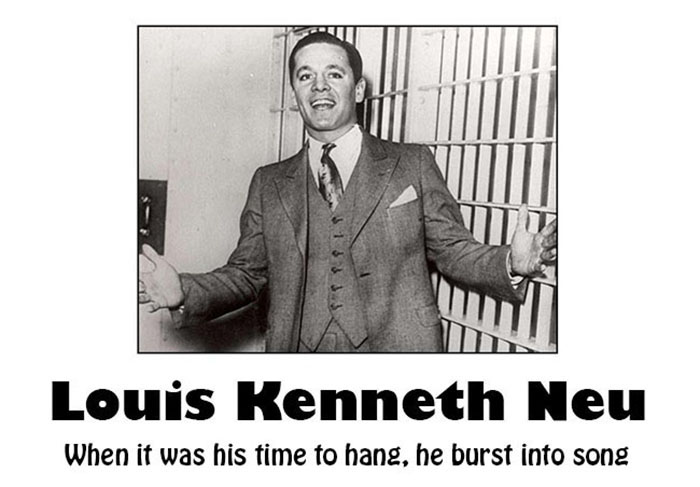| HOME • FAMILY • YESTERDAY • SOLVAY • STARSTRUCK • MIXED BAG |
 |
 |
|
|
Like a boomerang, the man who killed Lawrence Shead would travel far from Paterson, return, and be caught because of the car he was driving. However, it wasn't the one he stole from Shead, but one he took from Sheffield Clark, a man he subsequently murdered in New Orleans. The murders committed on consecutive Sunday evenings — the first in New Jersey, the second in Louisiana — might have been solved without attracting much newspaper attention were it not for the unusual behavior of Louis Kenneth Neu, the 26-year-old killer, an aspiring singer from Savannah, Georgia. By all accounts Neu must have been insane, but psychiatrists who testified otherwise were more persuasive than those who appeared for the defense. But if Neu weren't crazy, he certainly was unique among killers, putting on a show all the way from his arrest on September 20, 1933, to his hanging almost seventeen months later. Though his first murder was committed in New Jersey, and that's where he was arrested two weeks later, he was extradited to New Orleans for what looked to be the first of two trials. However, after he was found guilty in New Orleans, and sentenced to death, there didn't seem any point to trying him for another murder. When he heard the jury's verdict on December 15, 1933, Neu grinned, then shouted, “Gentlemen of the jury, you have my best wishes.” While he was taken back to his cell, he sang “Sweet Rosie O’Grady", and sang it loudly. The New York Post, on September 21, 1933, described the 26-year-old Neu as "a former soldier, seaman, cabaret singer and inmate of a Georgia insane asylum." Other stories described Neu as homosexual, but that might not have been true, though he preyed upon homosexuals, dangling himself as bait until they invited him to their home or their hotel room. He'd then threaten to expose them, and expect they'd be willing to pay for his silence. According to his statement after his New Jersey arrest, Neu went to Shead's apartment in Paterson and beat him to death with the flatiron because of the man's “offensive conduct.” In a panic, Neu took Shead’s car, drove to Charlotte, North Carolina, and abandoned the car there, then traveled by train to New Orleans where, four days later, he met Nashville, Tennessee, businessman Sheffield Clark in the lobby of the Jung Hotel. He went to Clark’s room and killed him with a blackjack, after Clark refused to give him money. Somewhere along the time, Neu befriended Mrs. Eunice Hotte, a twenty-five-year-old coffee shop waitress and estranged wife of a Marine sergeant. Neu told police, "I promised this girl to show her the bright lights of Broadway." So he took Clark's automobile, and he and Mrs. Hotte began their trip to New York. But first Neu made the mistake that would result in his arrest. He removed Clark's license plates, and replaced them with hand-printed cards reading “New Car — in Transit.” As his New Orleans lawyer, Clarence Doweling, would say later, “Hanging out such cards was like waving a red flag at a bull for every policeman he passed.” But that wasn't exactly true. Neu made it all the way to New Jersey, before any policeman was curious enough to ticket Neu for driving an unlicensed automobile. Imagine the policeman's surprise when the driver quickly confessed to two murders. He was turned over to Paterson detectives who said Neu told them he was relieved that he'd confessed. Detectives quoted Neu as saying, “If I’d gone on any longer, I’d have killed somebody else.” Mrs. Hotte was arrested with Neu, but soon released. Also arrested, then released, was Harold Parks, whom Neu had picked up near Philadelphia. It was revealed that Neu was married, but separated from his wife, Cecile, who was living in Key West, Florida, with the couples' two young daughters. At the time the 1930 United States census was taken, Neu and his wife were living in Savannah, Georgia, with his father. Neu also said he'd been honorably discharged from the Army in 1925 to cover up a scandal after he had beaten an officer and his wife at Langley Field, Virginia. In 1927, Neu was arrested for assaulting a taxi driver and was admitted to an asylum on a plea of insanity. When he was released, he found a job with the Strachan Shipping Company of Savannah, but was fired after he assaulted a man. Among the many odd things about this case was that Neu not only took clothing from his murder victims, but during his trial wore Shead's suit and Clark's shoes. During his four days in New Orleans, Neu sang in a nightclub, and while hanging around the hotel where he met Clark, posed as an American flier for the Chinese government. When he met Mrs. Hotte, he told her he was wealthy, when, in fact, he had only the money he was carrying, which was only a few dollars. In February, 1935, Neu was executed, but not before he sang something he'd slightly re-written for the occasion: "I'm Fit as a Fiddle and Ready to Hang." But that wasn't all the music that made his last few hours unusual. |
|
|
|
Neu was able to hear that broadcast from Cincinnati because a radio was placed in his cell that evening. Luckily for those on the periphery of this case, journalists of that era had the attention span of fruit flies. I found nothing written about Neu's wife or children, or his father. And I'm still wondering if Eunice Hotte got her job back when she returned to New Orleans. |
|
|
|
| HOME • CONTACT | |